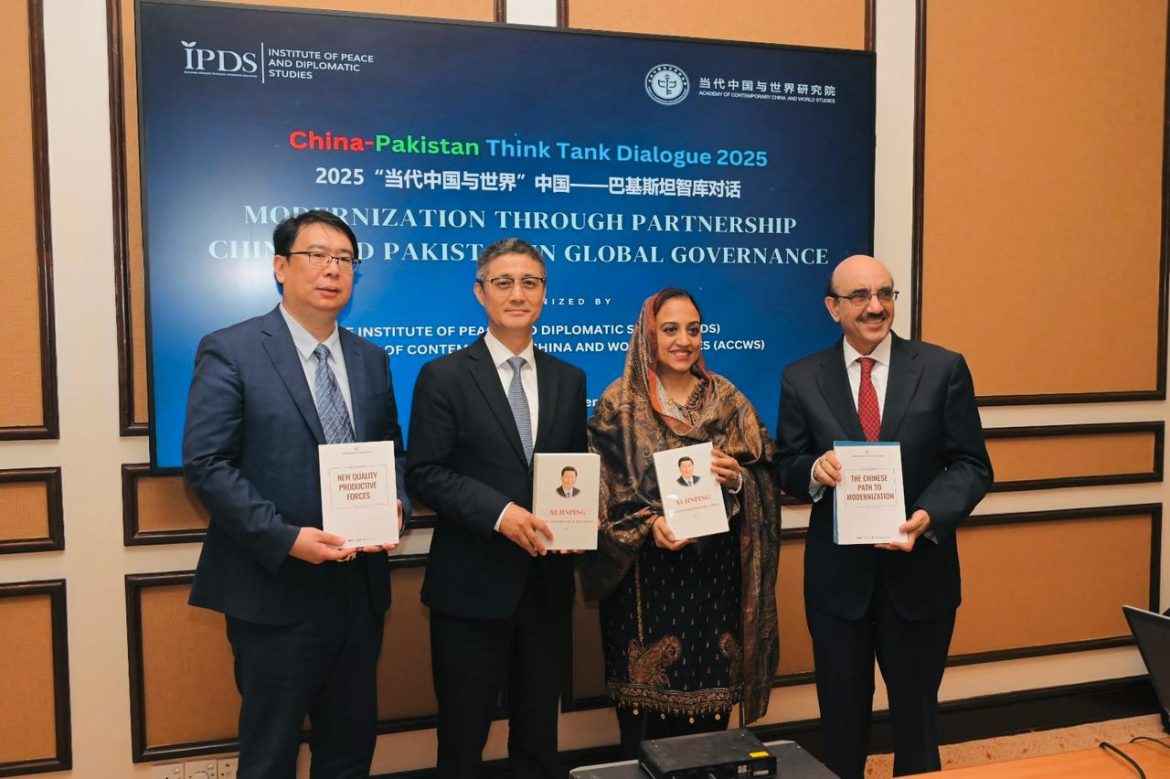ISLAMABAD ( WNAM REPORT ): Scholars, diplomats, and policymakers from China and Pakistan called for deeper cooperation in modernization, knowledge exchange, and global governance during the China–Pakistan Think Tank Dialogue 2025 held in Islamabad . The event was jointly organised by the Academy of Contemporary China and World Studies (ACCWS) and the Institute of Peace and Diplomatic Studies (IPDS) under the theme “Modernization through Partnership: China and Pakistan in Global Governance.”
In the opening Gao Anming, Editor-in-Chief of the China International Communications Group (CICG) announced the establishment of a joint research centre between CICG, ACCWS, and IPDS to strengthen academic cooperation and policy dialogue between the two countries. He emphasised the importance of collaboration among think tanks and media to promote understanding and mutual learning. Dr. Farhat Asif, President IPDS has highlighted the Institute’s collaboration through its Centre for BRI and China Studies and various research and studies that have been conducted as a result of the collaboration.
In his special address, Shi Yuanqiang, Deputy Head of Mission at the Chinese Embassy in Pakistan, said the second phase of the China–Pakistan Economic Corridor (CPEC) represented the most tangible expression of the two countries’ modernization partnership. He reaffirmed Beijing’s support for Pakistan’s economic growth and counterterrorism initiatives.
Former ambassador Sardar Masood Khan, who has represented Pakistan in China, the United States, and the United Nations, described China’s development model as a “stabilising and inclusive approach” and underscored the need for sustained intellectual cooperation between the two nations. Fan Daqi, Vice President of ACCWS, presented findings from a recent survey on perceptions of Chinese modernization across five Shanghai Cooperation Organisation (SCO) member states, including Pakistan. The study was conducted jointly by ACCWS and IPDS.
During the expert session discussion, the academics and policymakers shared their views on how modernization has made a significant impact and has made the important foundation for an inclusive China–Pakistan partnership. They also shared that modernization is not a linear or one-size-fits-all process. It thrives through partnership, mutual learning, and inclusive governance. And the Chinese approach towards modernization has made a substantial contribution to the development of Pakistan. Senator Sitara Ayaz, Secretary General of the International Parliamentarians Congress, proposed the creation of a Parliamentary Forum on China–Pakistan Modernization to ensure continuity in bilateral cooperation. Raisa Adil, Executive Director General at the External Publicity Wing, Ministry of Information and Broadcasting, said that “China has been not only a partner in investment but also a partner in imagination” and called for CPEC’s next phase to focus on cultural and intellectual exchanges. Asiya Nasir, Chairperson of the Resilient Women Network, highlighted women’s empowerment as vital to modernization efforts, while Dr. Tarak Waheed of SZABIST stressed the need for cross-border collaboration in education and research. Former FPCCI Chairman Raja Amer Iqbal urged greater private-sector innovation to bridge Pakistan’s technological gap, and Prof. Dr. Muhammad Munir of Muslim Youth University noted that China’s gradual and inclusive modernization model offered lessons for other developing nations. Dr. Najeeba Arif, Chairperson of the Pakistan Academy of Letters, said China’s success lay in harmonising tradition with progress, an approach resonating strongly with Pakistan’s own development vision.
The dialogue developed a consensus that the China–Pakistan partnership, grounded in shared modernization goals and intellectual cooperation, remains central to promoting regional stability and inclusive development. Participants included diplomats, scholars, media professionals, faculty members, and representatives from business and civil society.


